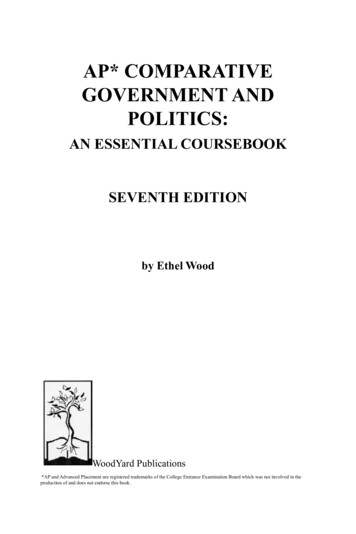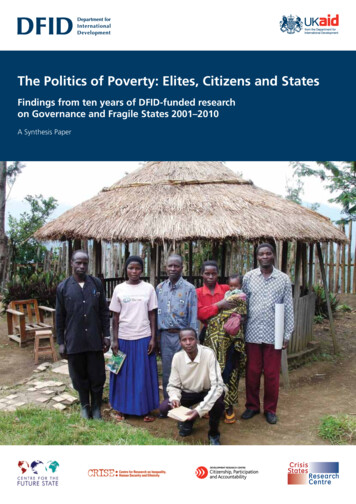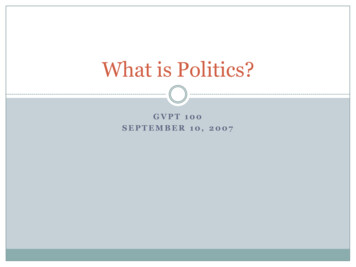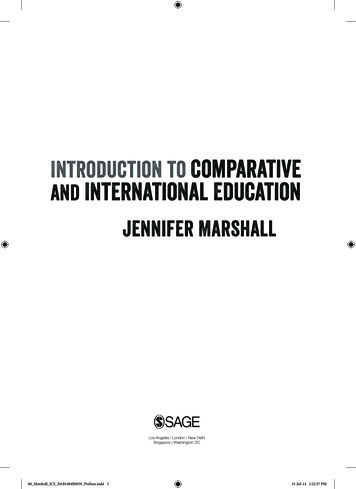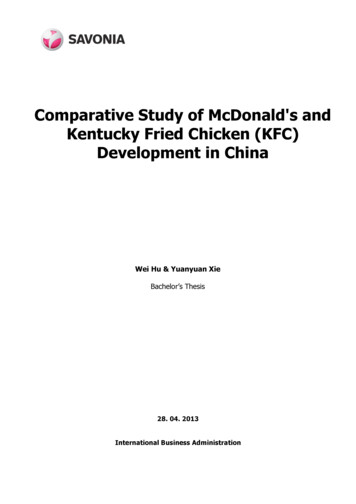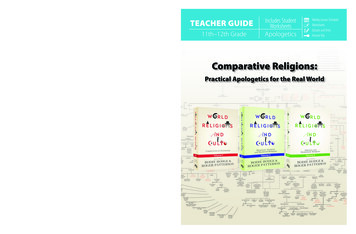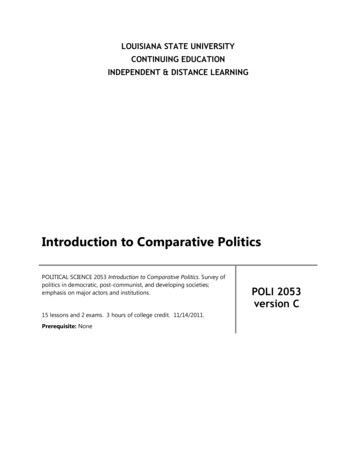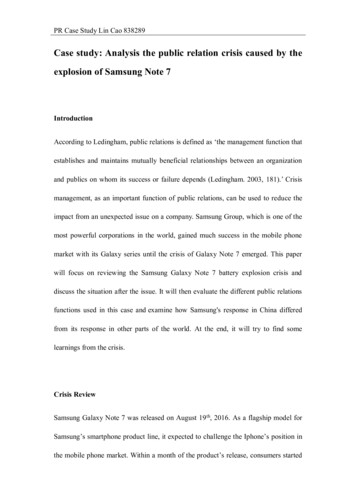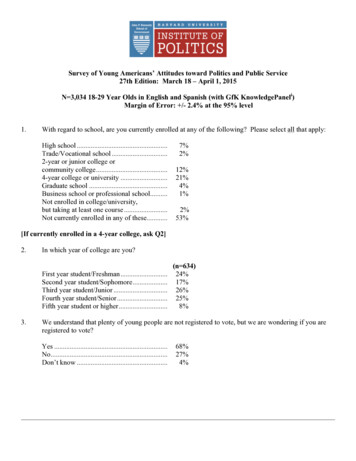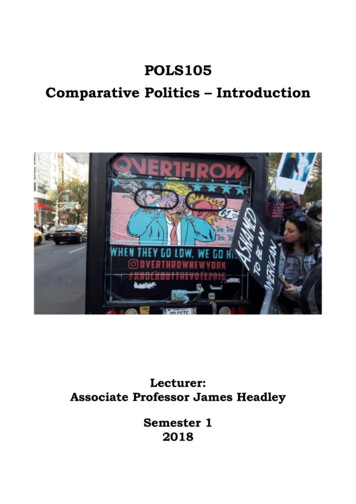
Transcription
POLS105Comparative Politics – IntroductionLecturer:Associate Professor James HeadleySemester 12018
Course descriptionProviding a foundation for understanding how politics operates in different countries, this paperconstitutes a key introduction to Comparative Politics. The first part of the course provides contextthrough introducing the state and nation, forms of government, and theoretical approaches andmethods in Comparative Politics. The second part examines the institutional framework in whichpolitics happens and the relationship between the different branches of government. The third partexamines the ways in which people participate in politics, how politics is communicated throughthe media, political parties and interest groups, voting and elections, and how policies are made.Course detailsLecturer: Associate Professor James HeadleyOffice Hours: Tues 1-2pm, Wed 10-11am (or make an appointment or just knock on mydoor!)Room 4S1, 4th Floor, Arts/Burns BuildingTel: 479 8616Email: james.headley@otago.ac.nzLectures and tutorials: There are two lectures per week, on Tuesdays and Thursdays, 10:00-10:50am.The lectures give an introduction to the main themes and issues of the course. There is also onetutorial per week, starting week three, for student-centred discussion, debate and group work.Highly recommended textbook: Rod Hague, Martin Harrop, and John McCormick, ComparativeGovernment and Politics: An Introduction, 10th edition (Basingstoke: Palgrave Macmillan, 2016).Assessment: Essay (25%)Group project (25%)Group presentation (25%)In-class test (25%)Course objectivesKnowledge of Comparative PoliticsBy the end of the course students should be able to: demonstrate knowledge of the political systems of a range of countries and compare themanalytically; display awareness of the various theories of Comparative Politics and be able to evaluatethem critically; show understanding of research methods in Comparative Politics; understand and interpret political news/events better!Academic skillsThe course will enable students to: construct effective academic essays (coursework and test) displaying coherent argumentsdrawing on relevant evidence; locate appropriate resources in the library and online; understand the strengths and weaknesses of various kinds of sources and use themappropriately; effectively communicate ideas and knowledge orally;2
utions and courtsLegislaturesMid-semester breakExecutivesBureaucraciesSub-national governmentCase study: The UK and the EUPolitical culturePolitical participationPolitical communication (Dr Chris Rudd)Political partiesElections (Prof. Janine Hayward)Case study: China (Dr Nicholas Khoo)VotersInterest groupsPublic policyRevisionIn-class testTues 27 MarThurs 29 MarTues 10 AprThurs 12 AprTues 17 AprThurs 19 AprTues 24 AprThurs 26 AprTues 1 MayThurs 3 MayTues 8 MayThurs 10 MayTues 15 MayThurs 17 MayTues 22 MayThurs 24 MayTues 29 MayThurs 31 MayLecture topicIntroduction to courseKey conceptsThe stateDemocratic ruleAuthoritarian ruleCase study: The Middle East (Prof. Bill Harris)Theoretical approachesComparing government and politicsLecture dateTues 27 FebThurs 1 MarTues 6 MarThurs 8 MarTues 13 MarThurs 15 MarTues 20 MarThurs 22 MarTutorial 4. Constitutions, legislatures,executivesTutorial 5. Group work: Drafting aconstitution (1)Tutorial 6. Group work: Drafting aconstitution (2)Tutorial 7. Group work: Drafting aconstitution (3)Tutorial 8. Group work: Creating apolitical partyTutorial 9. Group presentations:Political party launchTutorial 10. Test preparation andwritingEssay writing workshopTutorial 3. Essay planning and writingTutorial 2. Group discussion:Democracy and authoritarianismTutorial 1. Key concepts--Tutorial topicProvisional lecture and tutorial outline work collaboratively.
SourcesThe following is a guide to the sources available for this course. We will also provide advice intutorials to help you find relevant materials especially for your essay.Highly recommended textbookThe course follows closely the highly recommended textbook:Rod Hague, Martin Harrop, and John McCormick, Comparative Government and Politics: AnIntroduction, 10th edition (Basingstoke: Palgrave Macmillan, 2016).You will need to read the appropriate chapter for each topic – I suggest before the lecture, andcertainly before the tutorial on that topic.Other recommended textbooksFor your essay and for revision of specific topics for the test, you should also consult a selectionfrom the other available introductory textbooks or reference books listed below. All of thesetextbooks will be available in Course Reserve in the library or are available as ebooks.Boix, Carles and Susan C. Stokes (eds), The Oxford Handbook of Comparative Politics (Oxford/NewYork: Oxford University Press, 2009).Caramani, Daniele (ed.), Comparative Politics, 3rd edition (Oxford: Oxford University Press, 2014).Clark, William Roberts, Matt Golder and Sona Nadenichek Golder, Principles of ComparativePolitics, 2nd edition (Los Angeles: SAGE, 2013).Danziger, James N., Understanding the Political World: A Comparative Introduction to Political Science,11th edition (Boston: Pearson, 2013).Heywood, Andrew, Politics, 4th edition (Basingstoke/New York : Palgrave Macmillan 2013).Hislope, Robert and Anthony Mughan, Introduction to Comparative Politics: The state and ItsChallenges (Cambridge/New York: Cambridge University Press, 2012).Krieger, Joel (ed.), The Oxford Companion to Comparative Politics (New York: Oxford UniversityPress, 2013).Mahler, Gregory S., Principles of Comparative Politics (Boston: Pearson, 2013).Newton, Kenneth and Jan W. van Deth, Foundations of Comparative Politics, 2nd edition(Cambridge/New York: Cambridge University Press, 2010).O’Neil, Patrick H., Essentials of Comparative Politics, 4th edition (New York: Norton, 2013).Other booksThere is a large range of books in the library and e-books held by the library relating to specifictopics covered in the course and to particular countries or regions, which will be usefulparticularly for your essay. You can find these by searching the library catalogue as well as lookingon the shelves in the appropriate section of the library. Given the constantly-changing nature ofpolitics, more recently-published books are often the most useful.At the end of each chapter of the Hague, Harrop, and McCormick textbook there is also a list ofrecommended further reading.The following two books are in Course Reserve and are a good starting point beyond the textbooksfor looking at particular topics and countries:O’Neil, Patrick H., Karl Fields and Don Share, Cases in Comparative Politics, 4th edition (New York:Norton, 2013).4
O’Neil, Patrick H. and Ronald Rogowski (eds), Essential Readings in Comparative Politics (New York:Norton, 2013).Article databasesYou can find journal articles for your essay by searching on the library home page or fromdatabases such as Academic Search Complete, Factiva, and ProQuest; they can be accessedthrough the Article Databases section of the Library web-site (browse by Database name or click‘Politics’ under ‘Browse by Subject’).WebsitesThere are numerous online resources relevant to Comparative Politics, ranging from countryprofiles to institution websites, etc. See the ‘Guide to Comparative Politics on the Internet’ on thetextbook website, /Guide-to-Comparative-Politics-on-the-Internet/It is also worth keeping up with the world news and thinking about how current political eventsrelate to themes covered in the course. ‘7. Searching the News Online’ in the textbook website’s‘Guide to Comparative Politics on the Internet’ lists some useful sites.Also, the CIA World Factbook is a useful starting point for information on the political system ofspecific countries: -factbook/There is useful advice on using websites under ‘3. Assessing Internet Sources’ in the textbookwebsite’s ‘Guide to Comparative Politics on the Internet’, and also in the leaflet ‘How to EvaluateWebsites’ under ‘Study Skills’ on Blackboard.5
AssessmentResearch essay: comparative study (25%)Due: Monday 16 April, 12 noonWord limit: 1500 wordsN.B. You will not receive a mark for the essay if you have not attended tutorials 1-3 (weeks 3-5).If you are unable to attend any of these tutorials for reasons beyond your control (e.g. sickness,bereavement, etc.), please contact me with the appropriate documentation to excuse your absence.Compare and contrast one democratic with one (semi-)authoritarian state.For this assignment, you will focus on two cases: one democratic state and one authoritarian orsemi-authoritarian/hybrid state. The essay must be an analysis (rather than simply a descriptionof the two states): you must compare the cases in the context of what kind of political system thestates have as covered in the first part of the course. Topics to be covered include (but notnecessarily in this order or structured in this way): what are the key features of democratic and authoritarian/semi-authoritarian politicalsystems? how do the two states illustrate these features? what specific examples from the two states demonstrate the contrast in political system? what are the difficulties in categorising states in this way?The essay will be assessed on the basis of the following criteria: structure and organisation;analytical development;appropriate use of sources;understanding of the issues;clarity of style;correct use and formatting of references and bibliography (I will accept any of the widelyused academic reference styles as long as you are consistent); correct grammar and spelling; not significantly exceeding the word limit (1500 words), but answering the question insufficient detail (you should be writing at least 1300 words, and no more than 1700).You should plan the essay carefully so that it develops a coherent argument, with clearly ‘signposted’links between sections. You may use headings for sections, but not too many as it makes it disjointed,and make sure that you still explain the links between sections. Proofread the working draft carefullyto check that each sentence is clear and grammatical.We will give you advice in tutorials to help you to plan and write your essay. Advice on essay writingand referencing can also be found on the Student Learning Website athttp://hedc.otago.ac.nz/hedc/sld.html. I have put a number of their study skill guides onBlackboard in the ‘Study Skills’ folder under ‘Course Documents’, and you can also find usefulinformation through the ‘Study Smart’ tab on Blackboard.6
Group project: drafting a constitution (25%)Due: Monday 14 May, 12 noonN.B. You will not receive a mark for the project if you have not attended tutorials 4-7 (weeks 710). If you are unable to attend any of these tutorials for reasons beyond your control (e.g. sickness,bereavement, etc.), please contact me with the appropriate documentation to excuse your absence.As a group (5-7 students), you will submit a portfolio consisting of: the main points of a written constitution resulting from the tutorial simulation; justification for the choices you have made; an outline of any problems/limitations.Full details will be given in the first tutorial devoted specifically to the simulation (tutorial 5, week8).The portfolio will be marked and each member of the group will receive that mark towards theirfinal grade.Group presentation: creating/launching a political party (25%)Due: Tutorial 9 (Week 12, Monday 21 – Wednesday 23 May)N.B. You will not receive a mark for the presentation if you have not attended tutorials 8-9(weeks 11-12). If you are unable to attend either of these tutorials for reasons beyond your control(e.g. sickness, bereavement, etc.), please contact me with the appropriate documentation to excuseyour absence.As a group (5-7 students), you will present the manifesto of your new political party in the tutorial.Full details will be given in the first tutorial devoted to the exercise (tutorial 8, week 11).In-class test (25%)Thursday 31 May, 10.00-10.50amAssesses your understanding and knowledge of themes covered in the second and third part of thecourse (Institutional Framework; Participation and Policymaking). You will write two short essays,one from each section, from a choice of questions.Please let me know as soon as possible if you cannot attend the test so that we can makealternative arrangements.7
Formatting and submitting the research essayPlease use 1.5 or double spacing, and ‘full justify’ (align paragraphs to the left and right margins).You may print the essay double-sided.Make sure that you provide a full bibliography of sources used.The department does not have a specific referencing style; the emphasis is on the consistentapplication of the chosen style selected by the student. For recommended referencing styles pleasego to ents/index.html#assessment andscroll down to Style and Formatting.Essays must be put in the 100-level essay box by the corridor to the Politics Department (ArtsBuilding, 4th floor, North end) by 12 noon on the due date. You must attach a cover sheet(template on Blackboard) to the hard copy giving title and code of paper, title of essay, your nameand id. number, date of submission, word count (excluding bibliography), and signed plagiarismdeclaration:Declaration: I have read and understood the University plagiarism policy. I declare that thisassignment is entirely my own work, all sources have been properly acknowledged, and thatI have not previously submitted this work, or any version of it, for assessment in any otherpaper.You must also upload an electronic copy of your essay to Blackboard (under ‘Assignments’). Thiswill allow it to be automatically checked for plagiarism by the University’s Safe Assign software asexplained below:Safe Assign is a plagiarism detection tool which can report matches between sections of students’ worksubmitted to it and material on a comprehensive database to which Safe Assign has access. Thisincludes material on the internet and other students’ assignments which have previously beensubmitted to Safe Assign.Assignments will need to be submitted to the Final Version assignment folder under ‘Assignments’on Blackboard. You may submit your assignment to this folder only once.You also have the option of submitting a draft assignment to the ‘Draft’ folder. If you choose to utilisethis option, you will receive the report generated which contains a percentage mark of the paper thatmatches other sources. [N.B. the percentage figure under ‘Matching’ can be misleading; it is best tocheck the ‘SA report’ to see if there are any issues]. Assignments submitted to the ‘Draft’ folder willnot be assessed; however, the report will be available for the paper co-ordinator to view.You can find further information on Safe Assign sm/PlagiarismThe University of Otago takes the issue of plagiarism— copying or paraphrasing another’s work,whether intentionally or otherwise, and presenting it as one’s own—very seriously. Plagiarism isregarded by the University as one form of academic tegrity/). Any of the following may constituteplagiarism and result in investigation and possible punishment:1. copying or cutting and pasting text from others without using quotation marks or blockquotes to identify that text, nor clearly indicating the source (this includes paper andelectronic sources)2. copying visual materials, images and/or physical objects without clearly indicating thesource8
3. using poor paraphrasing of sentences or whole passages without referencing the originalwork4. using another person’s ideas, work or research data without acknowledgment5. copying computer files or computer code without clearly indicating their origin6. submitting another student’s work in whole or in part, where this is not specificallypermitted in the course outline7. submitting work that has been written by someone else on a student’s behalf8. resubmitting portions of previously submitted work without indicating the source.Note that the University's policy on academic integrity states that while plagiarism can beunintentional or intentional, even if it is unintentional, it is still considered to be tegrity/otago006307.html).Any student found responsible for plagiarism in any piece of work submitted for assessment shallbe subject to the University’s academic misconduct regulations, which may result in variouspenalties, including forfeiture of marks for the piece of work submitted, a zero grade for the paper,or in extreme cases exclusion from the University.Please speak to me if you have any queries regarding the citation of material.Department policy on extensionsEssays must be handed in by the due date unless an extension has been granted. Essays that arenot submitted on time without an extension will receive a mark of 0.The Extension Request form can be downloaded from the Politics webpage, or may be available onBlackboard. Completed forms must be emailed to the Department at politics@otago.ac.nz inadvance of the assignment due date. No retrospective application will be accepted except in thecase of a serious medical condition, for which a medical certificate is required.Extensions will be granted only for the following cases:1. Ill-health2. Bereavement3. Personal difficulties of a serious nature4. Provincial or national representative activities5. Job interviews outside Dunedin.Nothing else (such as pressure of other university work) will be accepted as a legitimate reason forextensions. Computer problems do not constitute an exceptional circumstance unless it is anofficially-notified failure of University equipment.Your application for an extension must be accompanied by evidence:1. Medical certificate for ill-health2. Documentary evidence for bereavement3. Written statement in support of your application from another university officer forpersonal difficulties of a serious nature4. Documentary evidence for provincial or national representative activitiesNo other evidence will be accepted. The evidence must be submitted to the Department of Politicsat the same time as the application for an extension either in hardcopy or as an email attachment ofscanned image.Application with evidence does not guarantee the grant of extensions. The maximum length of anextension is ONE WEEK, i.e. five working days (except in the case of serious medicalconditions).Return of marked workAssignments will be handed back in tutorials or lectures in the first instance. After that they will beavailable for collection from Politics reception (room 4C12, 4th floor, Arts Building) between 9-9
10am or 2-3pm Tuesday to Friday. NB: Assignments/tests will only be available for collectionduring these hours.Student supportClass representativeYou will be asked to nominate a class representative who will meet with the Head of Departmentto provide feedback on the course. This is an important role which is valued by the Departmentand can be added to the service section of your CV. OUSA provide training and resources.I will be happy to discuss any concerns you may have about the course. Alternatively, you canreport your concerns to the Class Representative who will follow up with departmental staff. If,after making approaches via these channels, you do not feel that your concerns have beenaddressed, there are University channels that may aid resolution. For further advice or moreinformation on these, contact the Departmental Administrator or Head of Department.Student Learning CentreThe Student Learning Centre at the University of Otago provides support for students in reading,writing, study skills, note taking and sitting exams and much more. They even provide individualessay consultations and can assist with your grammar and essay planning. Check their website forinformation and contacts: http://hedc.otago.ac.nz/hedc/learning/Library supportLibrary WebsiteThe Library website provides online access to resources and services, including Library Search Ketu(the library catalogue), Article Databases, Group Room Bookings, Opening Hours, Library Locations,Library News, Course Reserve, Past Exam Papers, Subject Guides, Information on Referencing /Citation style, our Self-help videos, Guides and more!Library Website: http://www.otago.ac.nz/libraryPolitics Subject GuideThis guide will help you find information for your assignments including articles, books, usefulwebsites and more!http://otago.libguides.com/politicsAsk a QuestionLibrary staff are available at the Central Library ‘Hub’ from Monday to Friday, 8:30 am to 5pm toanswer any questions you might have about using the Library. They are easily identified by theirvests! Or:Tel: 64 3 479 8910Email: ask.library@otago.acSubject Librarian for PoliticsIf other Library staff are unable to answer your questions, phone or email Christopher Seay forassistance. Or you can phone or email to make an appointment to meet with Christopher inperson.Tel: 64 3 479 8976Email: christopher.seay@otago.ac.nz10
Study SmartThe Study Smart tab in Blackboard offers advice and links to services and resources to help youwith your studies. It includes information about the Library, Student IT and the Student LearningCentre. Access via the link in Blackboard, or go to:http://otago.libguides.com/studysmartartsMāori and Pacific Island studentsPolitics Department contactProf. Philip Nel is the Politics Department’s kaiāwhina (support person) for Māori and PacificIsland students. Prof. Nel’s contact details are:Room 4N6, 4th Floor, Arts/Burns BuildingEmail: philip.nel@otago.ac.nzTel: 479 6549Humanities Division contactsAna Rangi is the Kaiāwhina Māori – Māori Student Support Officer for the Division ofHumanities. She is of Ngāti Porou/Ngāti Kahungunu/Whakatōhea/Ngāti Kuia/Ngāti Koatadescent, and originally from Christchurch. Her contact details are:Room 5C9, 5th Floor, Te Whare Kete Aronui (Arts/Burns Building)Email: ana.rangi@otago.ac.nzTel: 479 8681Inano Walter is the Pacific Island Students’ Support Officer for the Division of Humanities. Hercontact details are:Room 5C9a, 5th Floor, Arts/Burns BuildingEmail: pacificsupport.humanities@otago.ac.nzTel: 479 9616Office hours: Tues to Thurs, 9.30am – 2.30pmInternational studentsIf you are experiencing difficulty with your studies due to a disability, temporary or permanentimpairment, injury, chronic illness or deafness, you may contact, in confidence, the Universitysupport staff to discuss adaptations in teaching and learning strategies and resources that may behelpful.The Department of Politics encourages international students to seek support if they are havingdifficulties with their studies or meeting other challenges while they are a student at Otago. TheDepartment of Politics contact is Dr Lena Tan. Dr Tan’s contact details are:Room 4N9, 4th Floor, Arts/Burns BuildingEmail: lena.tan@otago.ac.nzTel: 479 8661Students can also contact International Student Support:Archway West BuildingEmail: international.support@otago.ac.nzTel: 479 8344Website: www.otago.ac.nz/international11
Disability supportIf you are experiencing difficulty with your studies due to a disability, temporary or permanentimpairment, injury, chronic illness or deafness, you may contact, in confidence, the Universitysupport staff to discuss adaptations in teaching and learning strategies and resources that may behelpful.Disability Information and SupportEmail: disabilities@otago.ac.nzTel: 479 8235Website: http://www.otago.ac.nz/disabilitiesDisclaimerWhile every effort is made to ensure that the information contained in this document is accurate, it issubject to change. Changes will be notified in class and via Blackboard. Students are encouraged tocheck Blackboard regularly. It is the student’s responsibility to be informed.12
O’Neil, Patrick H., Essentials of Comparative Politics, 4th edition (New York: Norton, 2013). Oth
